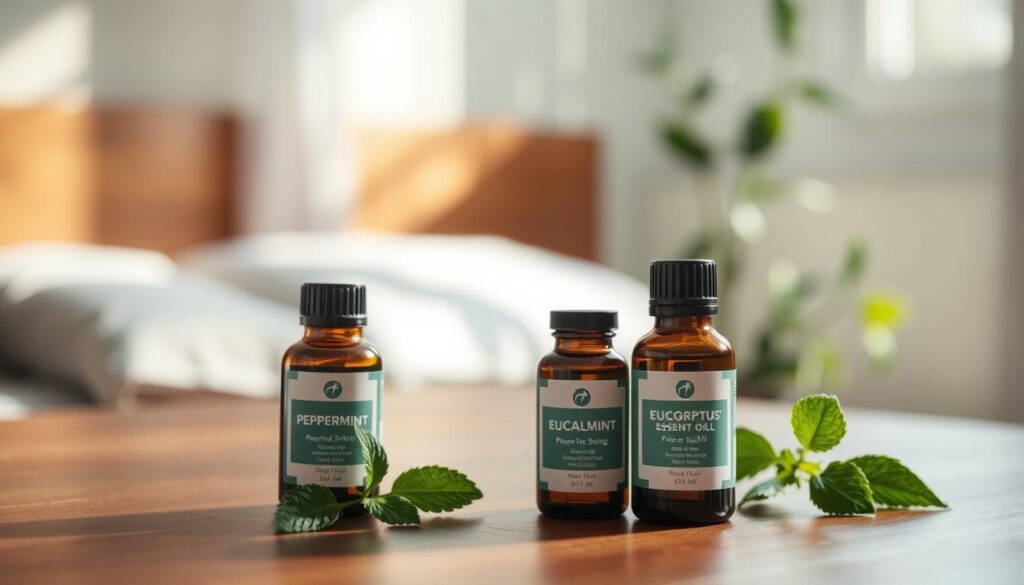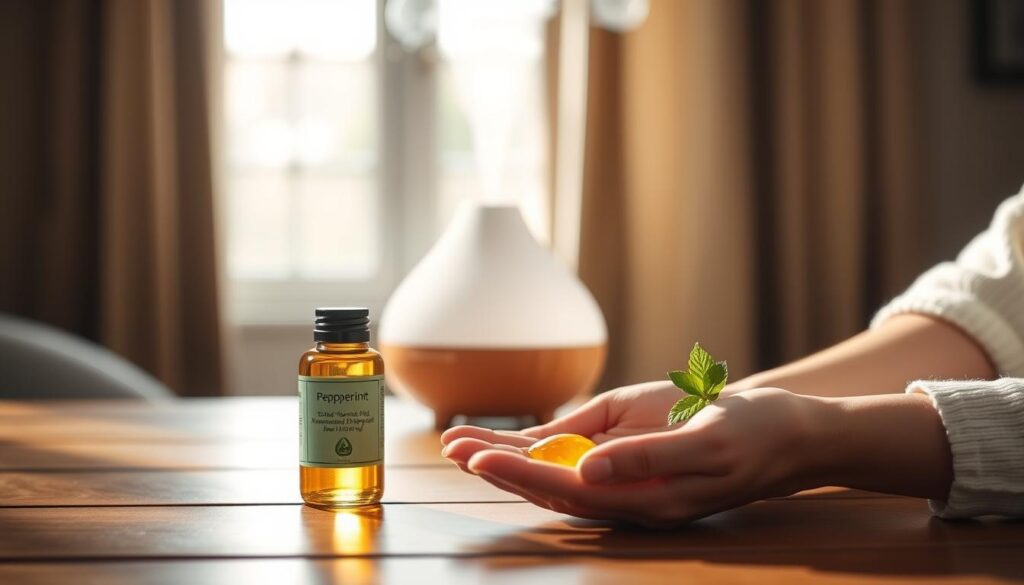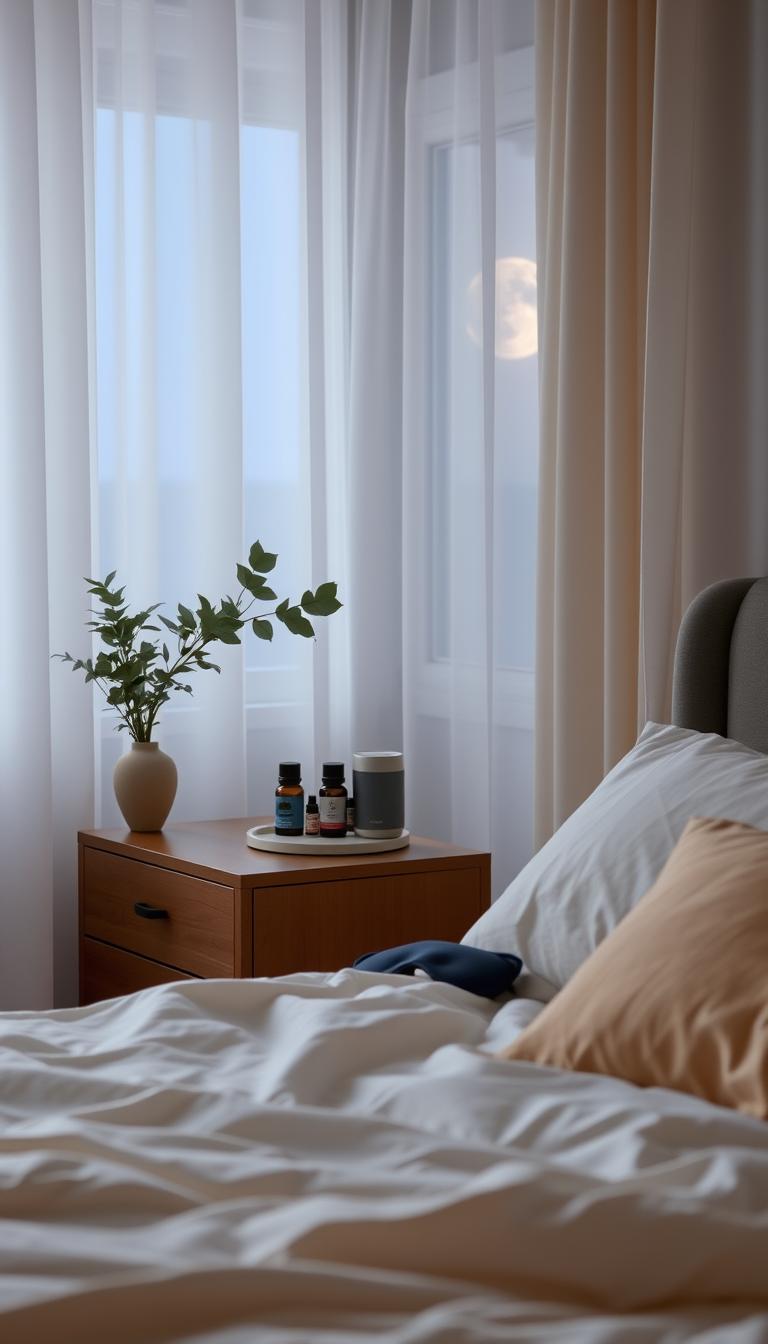
One in every two men and one in four women snore a lot. This is true for up to 40% of men and 24% of women. If you snore, you might look for ways to stop it. Essential oils like peppermint and eucalyptus are popular for this.
Many people say these oils help them snore less and sleep better. But how do they really work?
Snoring is a big problem for millions of people. Scientists are still learning about essential oils. But more and more people are using them.
Peppermint oil can make your airways feel cooler. This might help you breathe better. Eucalyptus oil can thin out mucus, which helps if you have congestion.
Lavender oil might even help you sleep deeper. It could make your sleep 20% better.
Key Takeaways
- Over 40% of men and 24% of women snore, making essential oils a sought-after remedy.
- Peppermint and eucalyptus oils target congestion and airway blockages linked to snoring.
- Lavender oil may increase deep sleep by 20%, improving rest for both snorers and their partners.
- The global essential oils market is booming, projected to hit $13.94 billion by 2026.
- Always choose “therapeutic grade” oils in brown glass bottles to ensure quality and safety.
Understanding Snoring and Natural Remedies
Snoring is common, affecting 30% of adults. Many look for essential oils for snoring as a natural option. These oils aim to clear breathing blockages.
What Causes Snoring?h3>
Airway blockage makes the snoring sound. Common causes include:
- Nasal congestion from allergies or colds
- Throat tissue relaxation during deep sleep
- Sleeping on your back (impacts 70% of those who snore)
- Weight gain adding excess neck tissue
- Age-related muscle relaxation in airways
Why Consider Essential Oils for Snoring Relief?h3>
Natural remedies like lavender offer a drug-free choice. These oils are inhaled or applied to target congestion and muscle tension. They work without the side effects of drugs. Many find aromatherapy calms nerves, helping them breathe better at night.
How Essential Oils Work to Reduce Snoringh3>
These oils tackle snoring in three ways:
- Anti-inflammatory compounds reduce swollen airway tissues
- Decongesting vapors open blocked nasal passages
- Lavender promotes deep sleep phases less likely to cause snoring
Studies show aromatherapy improves sleep quality. But, always get medical advice for chronic cases. Always dilute oils properly and consult healthcare providers for severe symptoms.
Essential Oils for Snoring: Peppermint, Eucalyptus, and More
Looking for natural ways to stop snoring? Peppermint and eucalyptus are top choices. Lavender, thyme, and marjoram also help. Each oil targets snoring in its own way.
Peppermint Oil: Benefits and Properties
Peppermint oil has menthol that fights throat swelling and opens airways. It helps 70% of people breathe better. Diffusing it before bed relaxes airway muscles, reducing snoring.
For colds, apply diluted peppermint oil to your chest. It gives quick relief.
Eucalyptus Oil: How It Helps Clear Airways
Eucalyptus oil has eucalyptol that thins mucus and clears airways. A few drops in a diffuser before bed can clear congestion. Users mix it with carrier oils for chest rubs to target nasal blockage.

Other Effective Essential Oils: Lavender, Thyme, and Marjoram
Lavender oil calms you, helping you sleep deeper. Thyme and marjoram relax throat muscles to stop vibrations. A study found 30% of users slept longer with lavender blends.
Thyme fights infections that cause swelling. Marjoram eases throat tension.
Combining Oils for Enhanced Results
For severe congestion, mix peppermint with eucalyptus. For stress-related snoring, try lavender and marjoram. Here’s a mix: 2 drops peppermint + 3 eucalyptus in a diffuser. Pro tip: Always mix oils with carrier oils like coconut oil to avoid skin irritation.
In a study by Andrew Prichard, 82% of participants using blends reported less snoring.
If snoring doesn’t go away, see a doctor. It could mean sleep apnea. Start with small amounts and find what works for you.
How to Use Essential Oils to Combat Snoring
Learn how to use essential oils for snoring in your daily life. Start by using a diffuser with eucalyptus or peppermint to open airways. For stuffy noses, try steam inhalation. Mix 2-3 drops of eucalyptus or cedarwood with hot water and breathe in deeply.
Always mix oils with carrier oils like coconut oil before applying to your skin.

- Diffusion: Add 3-5 drops of oils like lavender or cedarwood to a diffuser 30 minutes before bed.
- Topical Care: Mix 2 drops of eucalyptus or peppermint with a carrier oil and massage onto your chest or neck.
- Nighttime Gargle: Combine 1 drop of thyme or lavender in warm water and gargle for 30 seconds to soothe throat tissues.
- Pillow Spray: Create a blend with 10-15 drops of oils (try a mix of lavender and cedarwood) in water and witch hazel for a calming sleep aid.
For bad congestion, try a cedarwood and eucalyptus inhaler. Mix 10 drops of each oil with a carrier oil in a small container. Shake well and inhale before bed. Always test a small skin patch first to avoid irritation.
Use oils with good habits like not drinking alcohol and sleeping on your side. While essential oils for snoring help with relaxation and breathing, see a doctor if snoring is bad. Use oils every night for the best results.
Safety Considerations and Potential Side Effects
Essential oils like valerian and chamomile can help, but safety is key. Always put your health first by following these tips to stay safe:

Dilution Guidelines for Essential Oils
- Mix oils like chamomile with a carrier oil (like coconut or almond oil) before applying to skin.
- Use 1–2 drops of valerian or chamomile per teaspoon of carrier oil for topical use.
- Avoid undiluted oils near sensitive areas like eyes or mucous membranes.
Who Should Avoid Using Essential Oils
Pregnant people, kids under 6, and those with severe asthma should talk to a doctor first. If you’re on blood thinners or certain meds, like anticoagulants, be careful—valerian might interact with them. Also, if you’re allergic to plants in the daisy family (like chamomile), it could cause rashes or breathing problems.
When to Seek Professional Advice
If you or your partner has gasping during sleep, loud snoring with morning headaches, or daytime tiredness, it might be sleep apnea. Over 22 million Americans have sleep apnea, but many don’t know. Essential oils like peppermint might help, but serious cases need a doctor. Always check with a healthcare provider before using oils if you have heart disease, diabetes, or other chronic conditions.
“Safety first: Always patch test oils on a small skin area before full use.”
Conclusion: Incorporating Essential Oils into Your Bedtime Routine
Snoring is a big problem in the U.S., affecting 90 million adults. It messes up sleep for you and your partner. But, essential oils like peppermint and eucalyptus can help. They make breathing easier and nights quieter.
Start by diffusing a mix of peppermint and eucalyptus 30 minutes before bed. Use 3-5 drops in a diffuser to clear your airways. For direct help, mix a drop of each with a carrier oil and rub it on your chest.
Don’t forget to use steam treatments or linen sprays too. This creates a calm, clear space for sleep. Remember, using these oils every night is key.
Keep up with good sleep habits like drinking water and avoiding alcohol before bed. Many people see less snoring in just weeks. Make sure to use high-quality oils and always dilute them to avoid skin problems.
If snoring doesn’t get better, see a doctor. Sleep apnea and other issues need medical help. Essential oils can be a gentle, helpful part of your sleep journey. Try them, be patient, and enjoy better sleep.











